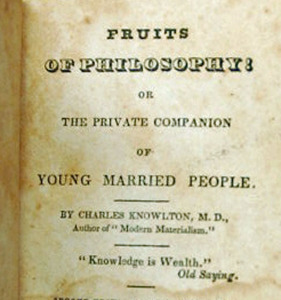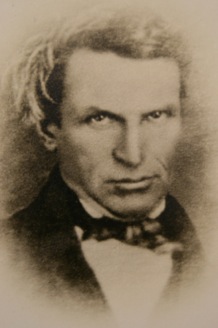In Elizabeth Kolbert’s recent article in The New Yorker talks about a guy who sure is worth knowing about: doctor Charles Knowlton. Why? Because he is a father of the idea that having children is a choice, that parenthood is optional. Check out what Kolbert says…
She writes that according to one historian, “Knowlton’s work was instrumental in spreading ‘the good news that sex and procreation could be separated.’ In other words, rather than being a consequence children became a choice.”
That word was spread with his short but bold book, Fruits of Philosophy: The Private Companion of Young Married People, by a Physician. It was published in 1832, and created quite the controversy.
 Kolbert tells us that “Not long after the first edition appeared, he was charged with publishing obscene literature and fined fifty dollars. Even before the trial ended, he was indicted on new charges. This time, Knowlton was sentenced to three months of hard labor. In 1834, he was hauled into court for a third time. The third trial resulted in a hung jury, as did the retrial that followed.”
Kolbert tells us that “Not long after the first edition appeared, he was charged with publishing obscene literature and fined fifty dollars. Even before the trial ended, he was indicted on new charges. This time, Knowlton was sentenced to three months of hard labor. In 1834, he was hauled into court for a third time. The third trial resulted in a hung jury, as did the retrial that followed.”
Even with all this legal trouble, his book was a “popular hit.” For nearly four decades it sold about a thousand copies a year in Britain, and over the course of twenty years, it went through nine editions in the United States.
But it really became popular in 1877 when two British reformers, Annie Besant and Charles Bradlaugh, reprinted Knowlton’s book. They were arrested and went to trial, which became a “national sensation.” The infamy of the trial arguably started to change the course of history when it came to birth control. “The once unmentionable business of birth control into a topic of daily discourse.” By 1880, over two hundred thousand copies had been sold.
Am I glad we are way past the type of birth control Knowles discussed in this book. In addition to the “withdrawal immediately before emission” method, he also describes the method of putting “a small piece of sponge, fitted with a narrow ribbon and inserted into a woman’s vagina ‘previous to connection,'” and a method involving “syringing the vagina immediately after ‘connection,’ with a solution of sulphate of zinc, of alum, pearl-ash, or any salt that acts chemically on the semen.” Yikes.
I bet Knowlton would be thrilled to see all of the methods of birth control we have today, including those on the horizon like RISUG. He was a considered a “freethinker” and “adventurous soul” in his time, and I applaud his boldness in getting the reality out there that just because we have reproductive capacity does not automatically mean we have to use it!
Know of other similar thinkers in history?



Amazing that he was arrested for publishing something on a subject that was already spoken about secretly from one generation to the next. You didn’t have to know how to read in order to hear about birth control. Birth control methods are older than human civilization. The ancient Egyptians used crocodile dung as a contraceptive, and Cleopatra used a golden ring as an IUD. (How effective these things were is another question, of course.)
Even people in the early 1800’s who talked about limiting the birth rate, like Thomas Malthus, could only get away with it by referring to “postponing the age of marriage.”
Crocodile dung–that is new to me! Thank god those days are gone!
Haven’t read him yet but I will now. There’s an e-book edition on Project Gutenberg.
http://www.gutenberg.org/ebooks/38185
Great link–thanks!
At the outset of the Modern Era, he may have foreseen the dis-function which may arise in Industrial and Post Industrial societies. The US is the archetype of such a society, “uncorrupted” by any influences of the ancien regime:
http://www.nytimes.com/2012/04/08/opinion/sunday/the-non-joie-of-parenting-us-style.html